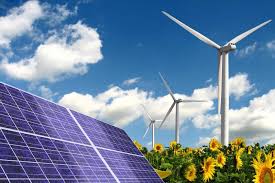Green power is electricity generated from renewable sources. (Unlike "gray power").
The aim is to reduce the emission of carbon dioxide (CO2 ) and harmful emissions ( NOx, SO2, soot , ...) and delay global warming by using inexhaustible and renewable energy: geothermal, biomass (fermented into methane gas), hydropower (turbines, wave energy, tidal energy, blue energy (won by the difference in salt concentration between seawater and freshwater), wind power, and solar energy.
Green power is not always as green as the vendors claim . Greenpeace has made a list of distributors (for Belgium).
 Not only the production shifts to alternative energy , including the distribution begins to tilt to a grid of many small units of own solar panels, heat pumps, wind turbines etc. instead of very expensive and large units.
Not only the production shifts to alternative energy , including the distribution begins to tilt to a grid of many small units of own solar panels, heat pumps, wind turbines etc. instead of very expensive and large units.
Smart grids are using (future) technologies to manage the grid and to match supply and demand. Similar to information over the internet (and servers), will also electricity be more distributed sold and distributed. (3D printing also offers already opportunities to decentralize material and production through grids.)
In the German village of Feldheim south of Berlin delivers a Green subsistence revolution to the local demand for power and heat. The village with 150 inhabitants manages its 43 wind turbines in a wind farm. Almost all have invested 3,000 euros in the project and have through a cooperative, the low price of electricity for ten years recorded. The money was before used to pay for power (Russia) and will now remain in the village.
In Makkinga (South Friesland, Nl) over four hundred households get their energy from cow manure and other organic (waste) materials.
In Apeldoorn in a residential area biogas from sewage sludge provides clean energy .
Lommel (be): the firm Farm Frites with 120,000 tonnes annually makes of its potato peelings and waste sludge from biogas electricity and hot water for the plant and electricity for around 12,500 households.
Bronsgroen emerged from the nagging contrast between a residential area of striking and subsidized, profitable solar panels, and a lesser area (in Bilzen) with (invisible) budget meters. It is a cooperative for renewable energy and energy efficiency, with social roots.
So it certainly pays to establish an energy cooperative, and invest (e.g. in solar panels) together.
Need a mass very practical info about even more alternatives ?
http://www.lowtechmagazine.com/
For some installations (and insulation), there are grants and subsidies to get.
Just as important as sustainable production is to reduce consumption. This can be done by isolating, by using less or no power consuming appliances and economical use of energy.
Diminishing
Steven Vromman ( b. 1960 ) is a Belgian environmentalist who strives for a sustainable world through ecological behavior. In 2008 he took on the challenge to environmentally conscious living and to achieve an ecological footprint of 1.6 hectares, being the "fair share" of space that each Earthling should arrive. In thirty different actions Vromman reduced his carbon footprint to 1.67 ha. You can follow the (Dutch) blog of Low Impact Man . https://lowimpactman.wordpress.com/
The ecological footprint ( (global) footprint) shows how much biologically productive land and water area a particular group (country, person .. ) in a year uses to maintain its level of consumption and to process waste.
https://footprintnetwork.org/en/index.php/GFN/page/calculators/
https://www.carbonfootprint.com/calculator.aspx
Earth Overshoot Day is the day when humanity has used Worldwide as much of Earth's raw materials , foodstuffs etc. as what the Earth in one year can yield. It can also per person, per division, ... And is every year earlier. (2013: 20 / 08 ).
If you use Ecosia as sustainable, Greenpeace Energy -driven search engine, then you also support the WWF.
Internet is often used much and without thinking about it. Obviously.
2006, Germany. Data centers and infrastructure use 2% of all energy, telecom 1%, computer and screens 7%. The ICT sector worldwide emits as much carbon dioxide as all the traffic. By 2030 the energy consumption of the Internet would be just as big as all the energy consumed worldwide now.
2007 Internet traffic in Belgium is doubling every 9 months. The power consumption is rising month on month by 5 to 10 percent.
2015 British experts warn that the Internet will consume in about twenty years almost all the energy from the UK. This is already 8 to 16 percent now.
